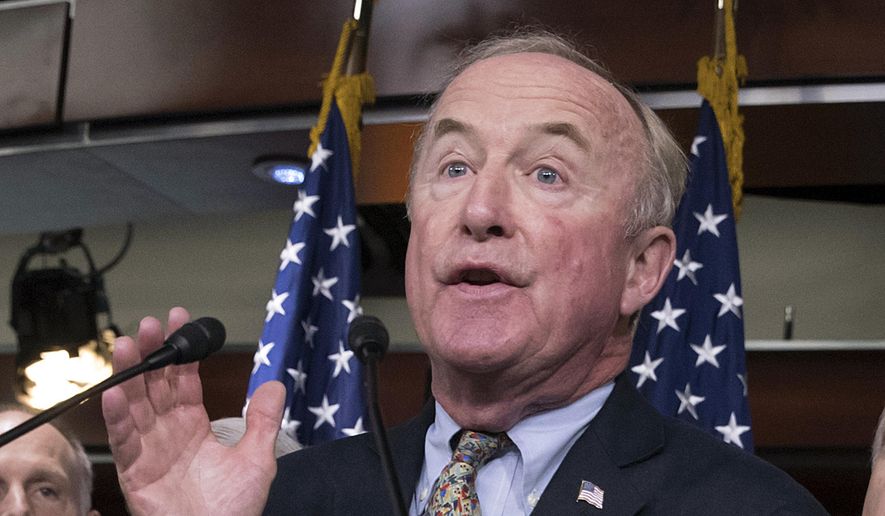The House on Thursday took another step forward on its 2019 spending bills, passing a $58.7 billion package that funds interior, environmental, financial services and general government programs.
The action means the House has now passed six of the 12 annual appropriations bills for the budget year that starts Oct. 1 — though lawmakers are still eyeing tough fights to come as they try to head off a shutdown showdown in the coming months.
The legislation packaged two bills together — a $35.3 billion bill funding the Department of Interior, Environmental Protection Agency, U.S. Forest Service and other associated agencies, along with a $23.4 billion bill that funds financial services and government programs, including efforts to fight the opioid epidemic and cybercrime.
“With these bills, the House is continuing its work to carry out responsible funding while maintaining accountability to the American taxpayer,” said House Speaker Paul D. Ryan, Wisconsin Republican.
The House passed the package on a 217-199 vote that broke largely along party lines.
Before the final vote, Democrats unsuccessfully tried to restore $380 million in election security funding, in one of their latest attempts to try to send a message to President Trump in the wake of his recent equivocations on Russian interference in the 2016 presidential election.
“It seems that Putin is Trump’s puppeteer, and that House Republicans have decided to join the charade,” said House Minority Leader Nancy Pelosi.
But Republicans said there’s plenty of money already going toward those efforts.
“You look over the past decade, you’ve seen billions of dollars funded by Republicans and Democrats in our bipartisan appropriations each year to do exactly that — secure elections here at home,” said Rep. Kevin Brady, Texas Republican and Ways and Means Committee chairman.
The full Senate has approved three of its 12 spending bills for next year. All 12 have advanced out of the Senate Appropriations Committee.
That’s not the case in the House. The House Appropriations Committee still has to approve what could be its most contentious bill — a $51.4 billion package to fund the Department of Homeland Security next year.
The House bill, unveiled this week, includes $5 billion for border security efforts, including President Trump’s U.S.-Mexico border wall, while the Senate version includes $1.6 billion for 65 miles of fencing in the Rio Grande Valley sector.
The White House cheered the $5 billion and said lawmakers should be willing to find cuts elsewhere to fully fund DHS without blowing up the budget.
“We’ll have to discuss that when we get to meeting — our numbers are smaller than that,” said Senate Appropriations Committee Chairman Richard Shelby, Alabama Republican.
House Republicans can muscle through spending bills through sheer numbers alone, but the threat of a Democratic filibuster in the Senate means those bills need to garner some bipartisan support.
Lawmakers in both parties are also weighing provisions to address the child separation crisis at the border — an issue that has consumed Washington, D.C. in recent weeks.
Rep. Kevin Yoder, Kansas Republican and chairman of the Appropriations Homeland Security subcommittee, says his bill will also include new funding for mental health care for children in the custody of Customs and Border Protection (CBP) and language to prioritize family reunification.
But Democrats are already signaling their opposition, saying they object both to the new wall funding and to plans to increase federal detention beds and hire hundreds of additional Immigration and Customs Enforcement (ICE) officers.
“We all know any hope for enactment of appropriations will require bipartisan bills that make sound investments,” said Rep. Nita Lowey of New York, the top Democrat on the House Appropriations Committee. “Yet again, a House Republican bill is moving us backwards.”
Negotiations over the first package of bills the House and Senate separately passed have also hit a snag over how to make up $1 billion-plus funding gap next year for VA Choice, a popular program that allows veterans to seek medical care from private doctors and hospitals.
Rep. Mike Simpson, Idaho Republican and a member of the conference committee that will hammer out differences between the two versions, said lawmakers should be able find the money within existing spending caps, which Congress agreed to increase in a two-year deal earlier this year.
“We can get this done,” Mr. Simpson said. “We’ve got time. That’s not holding it up that much.”
• David Sherfinski can be reached at dsherfinski@washingtontimes.com.




Please read our comment policy before commenting.